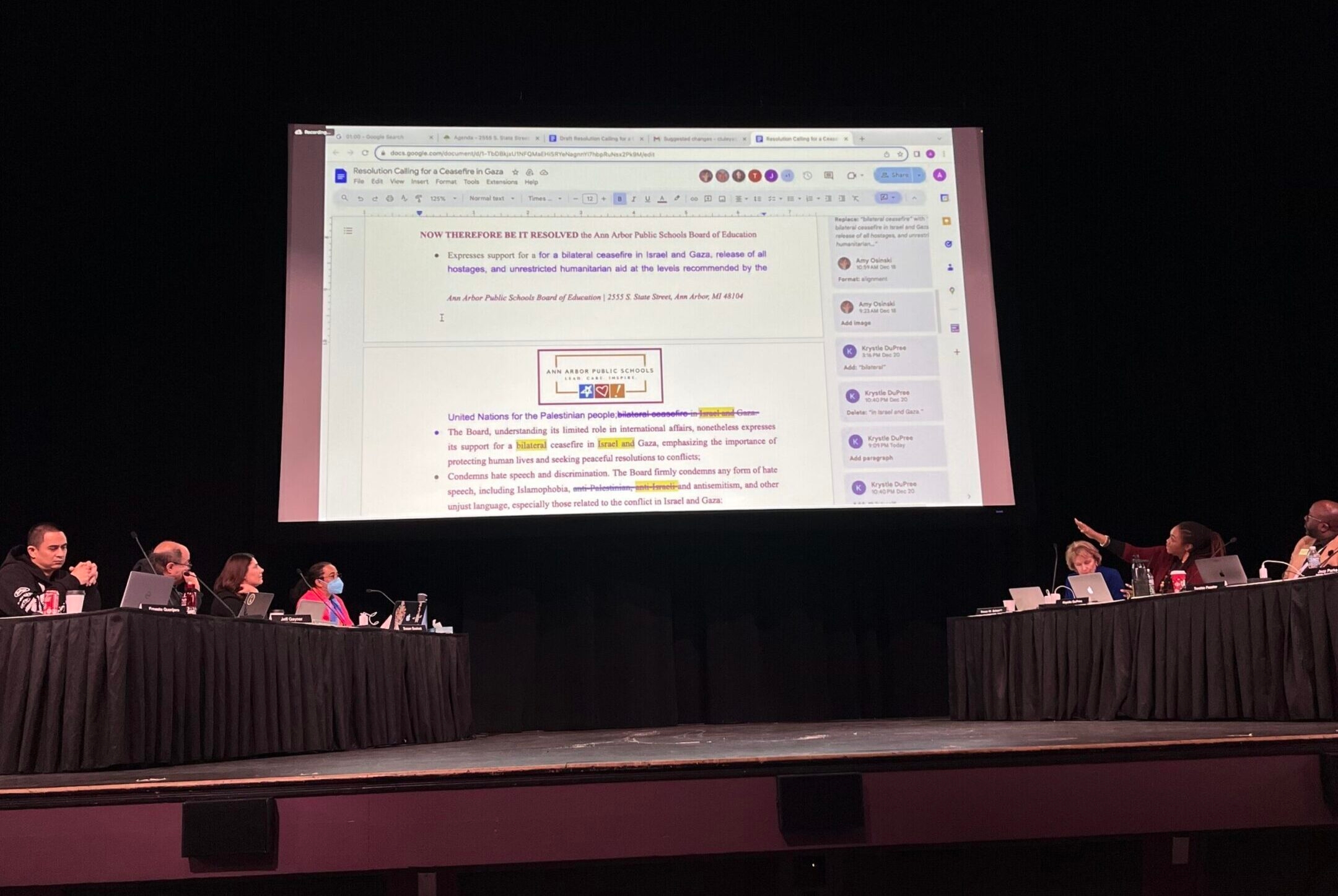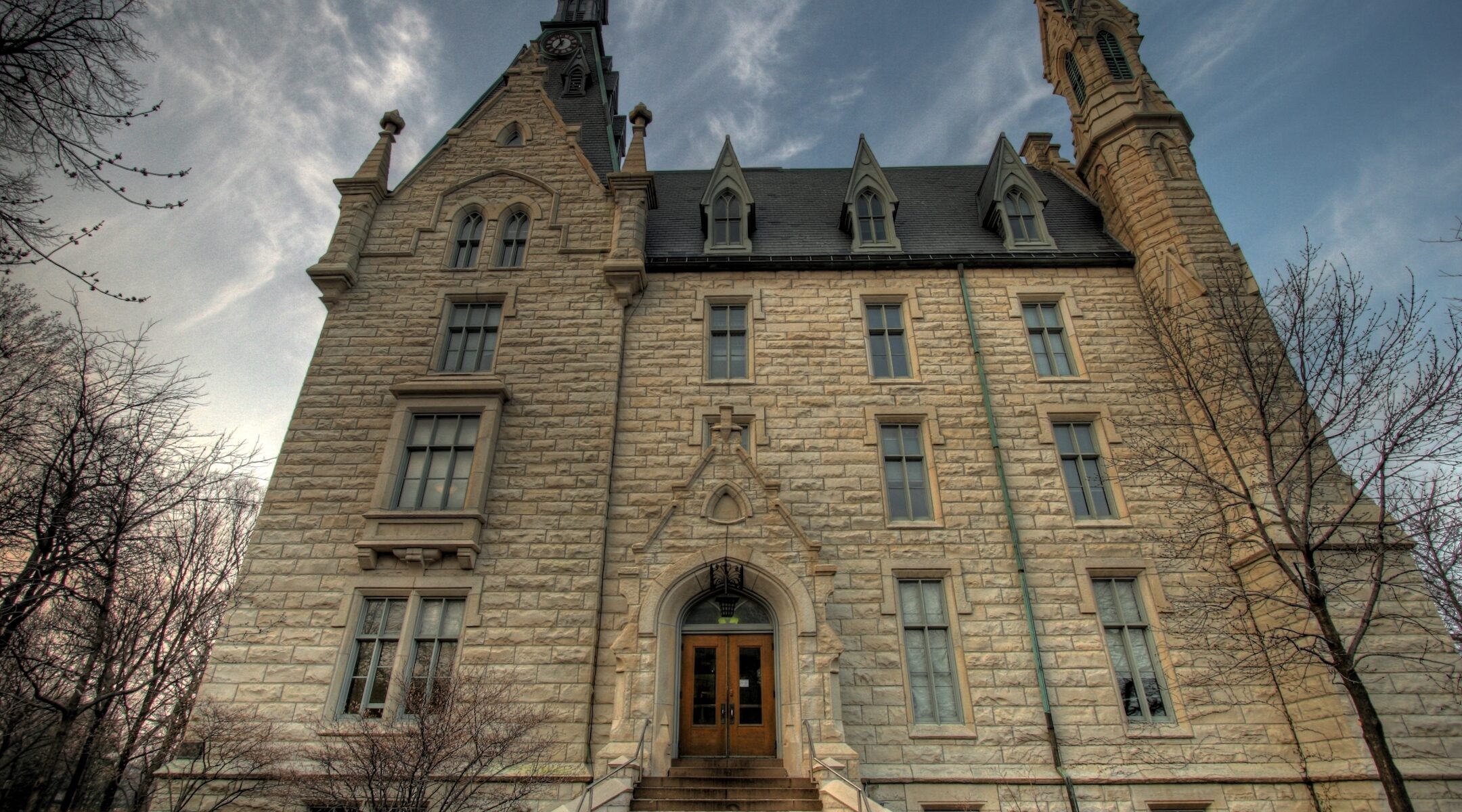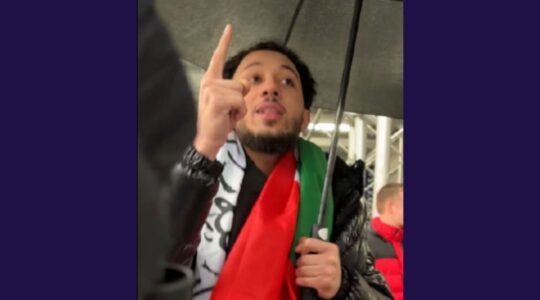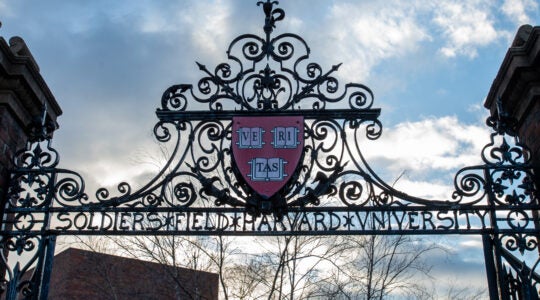(JTA) – On the same day the president of Northwestern University announced the new members of a task force formed to combat antisemitism on campus, the school became a target of a federal investigation into its handling of antisemitism.
The confluence on Tuesday would seem to be good timing for the private Big Ten school in Evanston, Illinois, as it tries to restore its Jewish community’s faith in the institution. Except the committee itself has already come under fire in some circles before it has even begun its work.
Some Jewish critics of higher education — including the conservative activist who filed the Title VI complaint that triggered Northwestern’s U.S. Department of Education investigation — have attacked the committee and its members in a pattern reminiscent of recent controversies at Stanford and Harvard. The critics have taken aim at the committee’s stated desire to combat Islamophobia as well as antisemitism, and at some members’ views on Israel and critical race theory.
“Northwestern President’s ‘Advisory Committee on Preventing Antisemitism and Hate’ launches with clear intent to block any recognition of antisemitism at the university,” posted Richard Goldberg, a Jewish former intelligence officer and Northwestern alum who worked in the Trump White House and, before that, for a Republican governor of Illinois. “The co-chair and membership make that clear. This is absurd.”
Goldberg cited committee co-chair Bryan Brayboy’s past work advocating for a “Tribal Critical Race Theory in Education” for Indigenous people. Goldberg also objected to another member’s work in the Boycott, Divestment and Sanctions movement targeting Israel; that member, Jessica Winegar, was a key voice pushing the American Anthropological Association’s vote last summer to boycott Israeli academic institutions.
Other committee members include the director of the campus Hillel, student representatives and members of the board of trustees; there are no rabbis on the committee.
Undeterred by the criticism, the committee’s co-chairs have said they aren’t going anywhere, and a spokesperson for Northwestern says the school stands behind them.
“Our committee will not weigh in on geopolitics. We will not be distracted by the outside noises that suggest we cannot work for whatever reasons,” Brayboy and co-chair Effi Benmelech, an Israeli-born finance professor, wrote in an open letter announcing their work on Tuesday.
They defined their committee’s chief responsibilities: “Listen to members of our community through a lens of curiosity and empathy”; create new “pedagogical opportunities for Northwestern’s community to learn about antisemitism, hate, and Islamophobia”; and make recommendations to leadership.
The committee did not return a Jewish Telegraphic Agency request for comment. A Northwestern spokesperson said the committee “represents Northwestern’s diverse perspectives,” adding, “We are confident in the work of this committee.”
The debate over the committee comes amid an ongoing parade of federal investigations into college campuses, many of them linked to the Israel-Hamas war. The Department of Education also announced new Title VI investigations this week into Yale University, Arizona State University, Ann Arbor Public Schools and a for-profit online law school. These join a list of more than 50 such investigations the department has opened since Hamas’ Oct. 7 attack on Israel. The attack, and the war it sparked, triggered a wave of campus activism and antisemitism.
At least three of the latest investigations, including Northwestern’s, concern antisemitism complaints brought by conservative activists, while Ann Arbor’s concerns a complaint about anti-Muslim sentiment that was brought by a Muslim public affairs group. Some of the complaints are based on unclear incidents.
“Frankly, we don’t even know what the facts are,” Donald Daugherty, Jr., senior counsel at the Defense of Freedom Institute, told JTA about an antisemitism complaint his own organization filed, which triggered the investigation at Yale. “So I guess we need to know what the facts are before we can really decide on an appropriate, mutually acceptable resolution.”
Daugherty said his group, which was formed in 2021 by Trump- and Bush-era education officials, got involved in Title VI because of its focus on “federal education issues.” Its first civil rights complaint, filed against the Oak Park, Illinois, K-12 district in 2022, dealt with that district’s policy of implementing race-conscious grading.
The group switched gears to antisemitism complaints after Oct. 7. Several of the schools the institute has since filed antisemitism complaints about, including Drexel and Rutgers, have also seen investigations opened, though the institute said their complaints did not trigger them.
In his Yale complaint, Daugherty wrote that his institute filed it “as an interested third-party organization that strongly advocates for a republic where freedom, opportunity, creativity, and innovation flourish in our schools.” The complaint goes on to name two specific Jewish Yale students who reported having been blocked from attending a campus event on the war in Gaza. But, Daugherty told JTA, he’s never spoken to either of them.
“We were just observing, monitoring media accounts as to what’s going on,” he said. “And we thought, well, we’ve got to get involved and help push back against it because it’s, among other things, a civil rights violation.”
JTA has reached out to representatives of the two students and to Yale, which recently appointed its first-ever Jewish chaplain, for comment.
Daugherty noted that groups like his are legally entitled to file complaints without working with any affected parties. Indeed, it’s a practice that has grown in recent weeks as Title VI antisemitism complaints have picked up steam among Jews and activist groups.
Zachary Marschall, the Jewish editor-in-chief of the conservative higher education website Campus Reform, said he’s personally responsible for filing 20 complaints, including the ones that prompted new investigations this week into Northwestern and ASU. His complaints have also been responsible for recent investigations at Brown and Temple.
Marschall told JTA he files his complaints as a concerned citizen who has less to fear than Jewish students at these schools. “Since I’m in a position to speak out, I feel morally obligated to do what I can to fight antisemitism on college campuses,” he said.
Marschall said his complaint at Northwestern involves two allegations. The first concerns reports of a pro-Palestinian rally on campus at which the colors of the Palestinian flag were projected onto a building. The second involves an Oct. 17 open letter from the university’s Asian American Studies program that described Hamas as “a political group” and described posters comparing the group to ISIS as “Islamophobic messaging” and “anti-Palestinian war propaganda.”
The program director did not reply to a JTA request for comment. A Northwestern spokesperson said the school “does not tolerate antisemitism” and added, “The complaint against Northwestern was not filed by a member of our community but instead by an outside organization.”
Marschall said he wasn’t impressed by the language Northwestern used to introduce its new antisemitism committee.
“Higher education manipulates ‘empathy’ and ‘inclusivity’ to ignore, erase, and whitewash Jewish suffering,” he wrote to JTA. “Northwestern’s rhetoric contains the same manipulative ‘empathy’ language that has enabled university administrations to ignore Jew hate and anti-Jewish discrimination.”
He said his other newly opened Title VI complaint, against ASU, cites events and rallies put on by the Tempe, Arizona, state school’s chapter of Students for Justice in Palestine in the days after Oct. 7. In response, an ASU spokesperson took a swipe at Marschall’s organization.
“Campus Reform, which says it ‘holds itself to rigorous journalism standards and strives to present each story with accuracy, objectivity, and public accountability,’ first learned about the letter to the Department of Education – because they sent the letter to the Department of Education,” the spokesperson wrote to JTA.
The spokesperson added that the university condemns “antisemitism and other hateful rhetoric in all its forms,” but emphasized, “ASU also is responsible for upholding free speech, as granted by the U.S. Constitution. The university neither endorses nor restricts opinions voiced at campus demonstrations. People on our campuses have the right to peacefully express their opinions as long as they comply with the law and the student Code of Conduct.”

Members of the Ann Arbor Public Schools board wordsmithed a resolution calling for a ceasefire in the Israel-Hamas war, Jan. 18, 2023. (Andrew Lapin)
Meanwhile, the federal investigation into Ann Arbor Public Schools in Michigan concerns a complaint focused on anti-Palestinian sentiment that was filed by the state’s chapter of the Council on American Islamic Relations. The complaint alleges that a middle school counselor told a Palestinian student, “I don’t negotiate with terrorists,” and that the school board did not respond properly when the incident was brought to its attention.
“CAIR-MI welcomes the Office of Civil Rights opening a formal investigation into whether Ann Arbor Public Schools adequately addressed the alleged comments made by the counselor at Tappan Middle School,” Dawud Walid, CAIR Michigan’s executive director, said in a statement.
Walid continued, “Calling a Palestinian Muslim student a ‘terrorist’ is a very offensive and hurtful comment that was compounded by the school board’s seeming lack of concern for the student when it was brought to their attention.”
A spokesperson for the school district did not return a JTA request for comment, but the former board president, who is Palestinian, previously issued a statement saying the board is “deeply concerned and dismayed” over the incident and promised to address it properly. The school board recently made headlines for becoming one of the only school districts to call for a bilateral ceasefire in Israel and Gaza.
Finally, Abraham Lincoln University, a private, for-profit online law school based in California, is also the target of a new federal shared ancestry investigation. The school did not return JTA requests for comment.
JTA has documented Jewish history in real-time for over a century. Keep our journalism strong by joining us in supporting independent, award-winning reporting.






